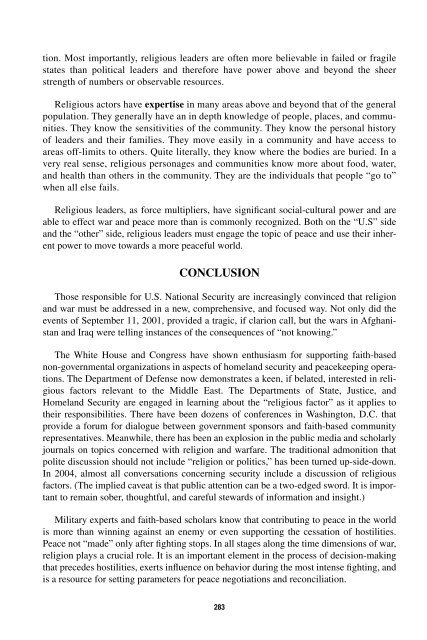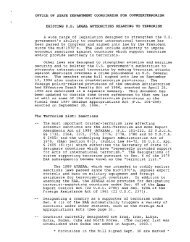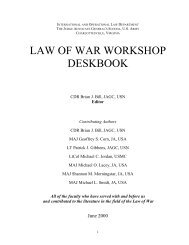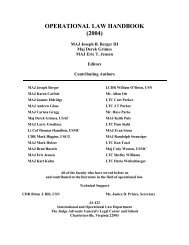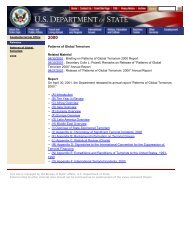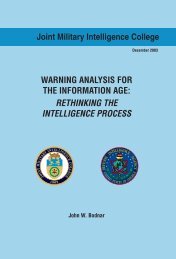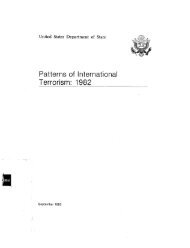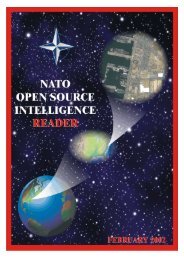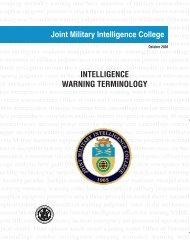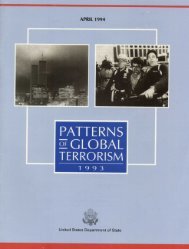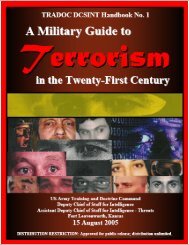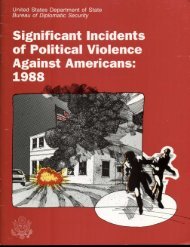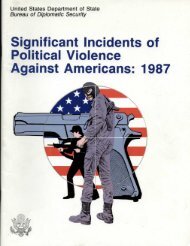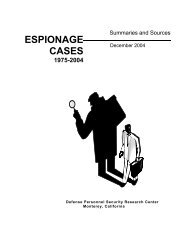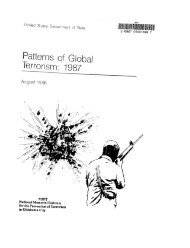learning with professionals - Higgins Counterterrorism Research ...
learning with professionals - Higgins Counterterrorism Research ...
learning with professionals - Higgins Counterterrorism Research ...
Create successful ePaper yourself
Turn your PDF publications into a flip-book with our unique Google optimized e-Paper software.
tion. Most importantly, religious leaders are often more believable in failed or fragile<br />
states than political leaders and therefore have power above and beyond the sheer<br />
strength of numbers or observable resources.<br />
Religious actors have expertise in many areas above and beyond that of the general<br />
population. They generally have an in depth knowledge of people, places, and communities.<br />
They know the sensitivities of the community. They know the personal history<br />
of leaders and their families. They move easily in a community and have access to<br />
areas off-limits to others. Quite literally, they know where the bodies are buried. In a<br />
very real sense, religious personages and communities know more about food, water,<br />
and health than others in the community. They are the individuals that people “go to”<br />
when all else fails.<br />
Religious leaders, as force multipliers, have significant social-cultural power and are<br />
able to effect war and peace more than is commonly recognized. Both on the “U.S” side<br />
and the “other” side, religious leaders must engage the topic of peace and use their inherent<br />
power to move towards a more peaceful world.<br />
CONCLUSION<br />
Those responsible for U.S. National Security are increasingly convinced that religion<br />
and war must be addressed in a new, comprehensive, and focused way. Not only did the<br />
events of September 11, 2001, provided a tragic, if clarion call, but the wars in Afghanistan<br />
and Iraq were telling instances of the consequences of “not knowing.”<br />
The White House and Congress have shown enthusiasm for supporting faith-based<br />
non-governmental organizations in aspects of homeland security and peacekeeping operations.<br />
The Department of Defense now demonstrates a keen, if belated, interested in religious<br />
factors relevant to the Middle East. The Departments of State, Justice, and<br />
Homeland Security are engaged in <strong>learning</strong> about the “religious factor” as it applies to<br />
their responsibilities. There have been dozens of conferences in Washington, D.C. that<br />
provide a forum for dialogue between government sponsors and faith-based community<br />
representatives. Meanwhile, there has been an explosion in the public media and scholarly<br />
journals on topics concerned <strong>with</strong> religion and warfare. The traditional admonition that<br />
polite discussion should not include “religion or politics,” has been turned up-side-down.<br />
In 2004, almost all conversations concerning security include a discussion of religious<br />
factors. (The implied caveat is that public attention can be a two-edged sword. It is important<br />
to remain sober, thoughtful, and careful stewards of information and insight.)<br />
Military experts and faith-based scholars know that contributing to peace in the world<br />
is more than winning against an enemy or even supporting the cessation of hostilities.<br />
Peace not “made” only after fighting stops. In all stages along the time dimensions of war,<br />
religion plays a crucial role. It is an important element in the process of decision-making<br />
that precedes hostilities, exerts influence on behavior during the most intense fighting, and<br />
is a resource for setting parameters for peace negotiations and reconciliation.<br />
283


